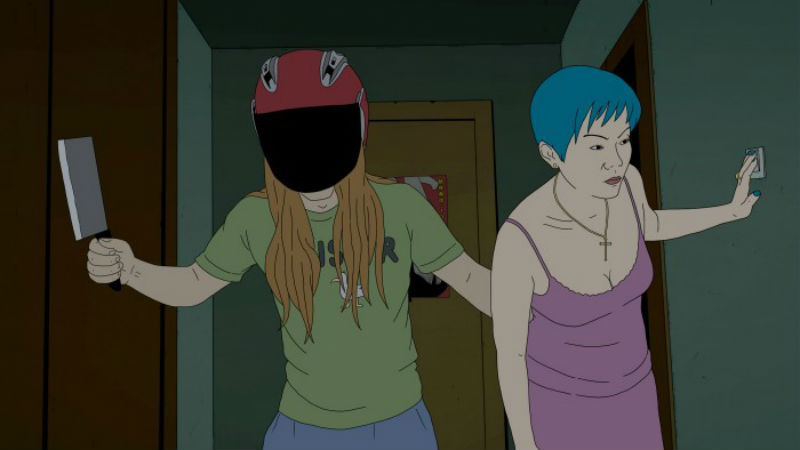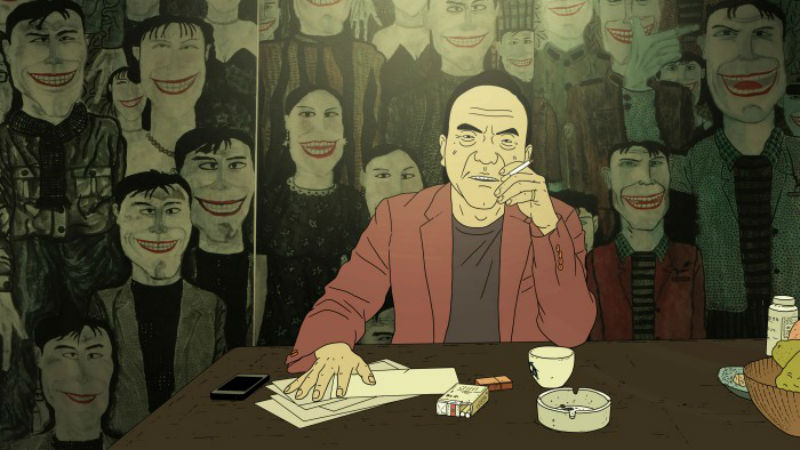QUICK AND DIRTY: LIVE FROM BERLIN
Chinese painter-turned-filmmaker Liu Jian’s third feature has the aesthetic trademarks of his two previous works: multiple textures, gingerly painted backgrounds and minimalistic faces combined vaguely dark and dirty imagery. His previous film Have a Nice Day impressed film critics and audiences alike six years ago at the Berlinale, by turning capitalistic Chinese dreams into a bloody nightmare. This is the very same festival where the premiered his latest creation. While still charming and affecting, Art College 1994 is not as powerful, sharp and subversive.
The story follows two male art students, Xiaojun and Rabbit, in the Chinese Southern Academy of Arts during the early 1990s as they collaborate on a painting. They discuss their ambitions, engage with Western art, challenge and debate with their professors. Two female music students, Lili and Hong, dream of performing together on stage. There’s a spark of romance of romance between Xiaojun and Lulu, however artistic ambition remains the main focus of this highly conversational and ruminative drama. Xiaojun and Rabbit could see their dreams slashed when a fellow student vandalises their work, and they seek to do justice with their own hands. This is more or less the pedestrian conflict that our protagonists experience.
These students witness their country undergo massive changes, including an inundation of foreign culture. They question the nature of life, the purpose of art, their school technique, while also pondering whether European and American artists are artistically superior. They talk about literature, philosophy, fine arts, music, and much more. They love Spanish painter Pablo Picasso, French composer Claude Debussy, German writer Immanuel Kant, Italian singer Luciano Pavarotti and American rocker Kurt Cobain. They are concerned that they are getting old too quickly, and that they have little prospect of recognition past 27 (the tragic age when Kobain, Winehouse, Morrison, Hendrix, Joplin and others died). They ponder what is it that makes a good artist: young age, suffering or poverty? Reflections fit for a restlessly creative mind such as the director Jian’s, one burning with both ambition and doubts.
This is a visually inventive and impressive film. The vaguely stylised human beings are juxtaposed against elaborate backgrounds. The director paints many of the landscape by hand and I would hazard a guess that he also utilises rotoscopic animation. Western symbols – a giant poster of Michael Jackson’s Bad, large Coca-Cola and McDonald’s signs – jostle with the towering Chinese architecture, a few derelict buildings and the occasional agitprop. Music is combined with delicate imagery, such as an insect climbing up a crumbling wall to the sound of Chinese music, and a montage of posters to the sound of Franz Schubert’s Ave Maria. The snow adds a soothing touch to the wintry closure of the story. These are the most beautiful and elegant elements of this 118-minute film, that gets lost in its extreme intertextuality, and a sometimes confusing and aimless plot. The action is just too discussive and reflective. While it might occasionally touch your heart and make you smile, Art College 1994 never quite hits you in the guts. Or in the face. It lacks the sharp political commentary, the absurd violence and quirky sense sense of humour that make its 2017 predecessor so memorable. These dirty qualities are suppressed by the constant attempt to convey a deep philosophical message about the nature of art.
This is a deeply personal, lifetime project. Art College 1994 is inspired by the 62-year-old director’s own experience at a prominent Chinese art school in the 1990s. The director had previously attended the Beijing People’s Army Art College at the age of just 18. It features a star-studded Chinese voice cast. They include actors Dong Zijian, Zhou Dongyu, Huang Bo, musician RenKe, comedian Papi, as well as internationally renowned filmmakers Jia Zhangke and Bi Gan.
Art College 1994 is in the Official Competition of the 73rd Berlin International Film Festival. It is very unusual for a-list festivals such as the Berlinale to pick animation movies for their main competitive strand, and I commend them for doing it.










